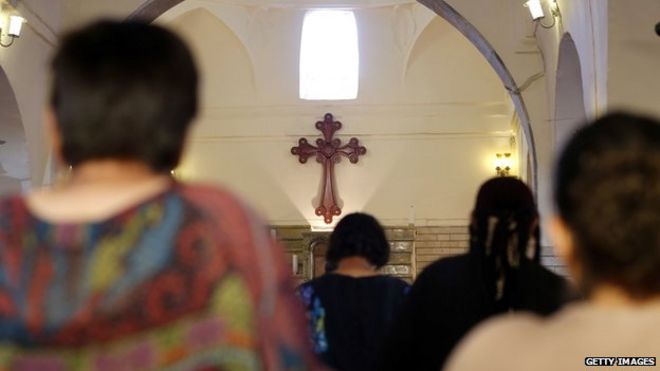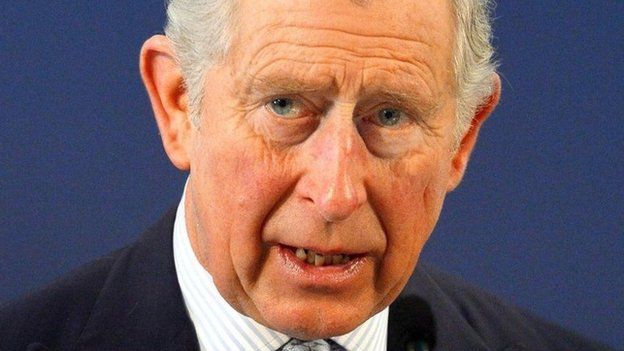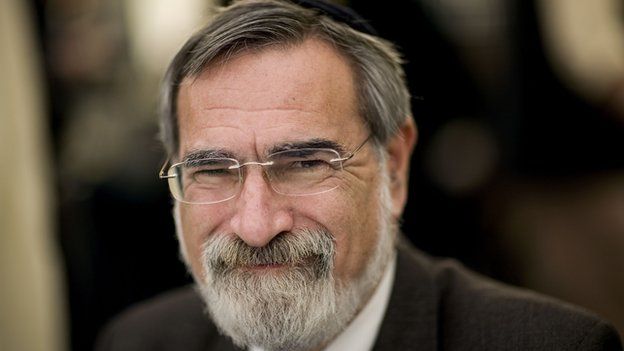Growing religious persecution 'a threat to everyone'
- 14 November 2014
- World

"I don't know if we will ever be able to go back to Syria. My mother wants to see her home again, but she may never be able to return."
Maria fights back the tears as she contemplates her country of birth, now wracked by fighting.
Her mother - now in her 80s - was able to flee the fighting in Syria and stay with her son in Canada.
But it is not clear whether she will return to a country where Christians and other religious minorities no longer feel safe or welcome.
The Syriac Orthodox church in west London where we speak is filled with families with similar stories to tell.
Across much of the globe, at the start of the 21st Century, religion is once again a matter of life and death - quite literally in Iraq and Syria, while elsewhere, admitting or defending your faith can land you in jail.
Meriam Ibrahim, a young Christian mother from Sudan, discovered that when she refused to renounce her faith even after she was placed on death row for "apostasy", or allegedly converting from Islam to Christianity.
Meriam - whose mother was Christian - has now started a new life in America with her husband and children, following an international outcry - but how many more Meriams are there?
Persecution and discrimination
One answer came last week.
On the same day that the news emerged of a Pakistani Christian couple burnt to death in a kiln by enraged Muslim villagers for apparently unwittingly burning the verses of the Koran, Prince Charles was addressing a gathering at the House of Lords on religious freedom.

The future King, who once said that he wished to be Defender of Faith, rather than Defender of the Faith on ascending the throne, made an eloquent plea for religious tolerance at home and across the world.
He spoke in a video message as the international Catholic charity, Aid to the Church in Need, launched a global report saying that religious freedom was at risk in 60% of the world's countries and had entered a period of serious decline.
The report termed the rising tide of anti-Christian persecution in several parts of the world "catastrophic", pointing out that Christians remain the most persecuted religious minority, due partly to their geographic spread and high relative numbers.
The charity also made clear that Muslims were experiencing what it called a serious degree of persecution and discrimination, "both at the hands of other Muslims and from authoritarian governments".
And it noted that Jewish people in western Europe were "subject to violence and other abuse that is generally low-level".
"However, such problems have grown, prompting increased emigration to Israel."
Of the 196 nations surveyed, between 2012 and 2014, the report concluded that religious freedom was compromised in 116, where religious minorities experienced persecution, violence, and systematic discrimination.
Perhaps unsurprisingly, the countries most recently in the headlines for the rise of the so-called Islamic State (IS) and the Islamist group Boko Haram were among the worst offenders.
Only a handful of countries, including Taiwan, Cuba, and Zimbabwe, had improved from the previous survey, even though the situation there remained "alarming".
In August, the world watched in horror as television pictures emerged from Iraq of members of the Yazidi religious minority, young and old, fleeing to the Sinjar mountain range as Islamic State fighters threatened them with death.
Feeling of betrayal
So why is it in these early years of the 21st Century, just as much of the West thought secularism had triumphed, that violence or intolerance in the name of religion is staging such a dramatic comeback in much of the Middle East, Asia and parts of Africa?

Some explain the violence in parts of the Middle East as a Sunni-Shia civil war, between the two main branches of Islam. Others have a different explanation.
The former Chief Rabbi, Lord Sacks, believes that the Middle East and parts of Asia and Africa are undergoing a seismic shift towards de-secularisation.
"They feel betrayed by secular nationalist governments that failed to deliver prosperity and national pride," he told the House of Lords in October.
"They consider the national boundaries imposed by colonial powers to be artificial and obsolete.
"They are uninspired by the secular culture of the West with its maximum of choice and minimum of meaning.
"And they have come to believe that salvation lies in a return to the Islam that bestrode the narrow world like a colossus for the better part of a thousand years.
"And the religious radicals are offering young people the chance to fight and die for their faith, winning glory on earth and immortality in heaven."
He concludes that violence in the name of religion can only be answered by the peaceful voice of religion, with Christians, Jews and Muslims coming together to reject hatred and violence.
Politicisation of religion
The religion editor of the Times Literary Supplement, Rupert Shortt, in his bookChristianophobia, points to the politicisation of Islam and the growing conservatism of some of the faithful that have made it progressively harder for Christians and Muslims to live side by side in many countries, including Nigeria, Iraq, Syria and Egypt.
He examines how war and political uprisings in the Middle East in recent years have led to between half and two-thirds of the Christians leaving the region where Christianity first took root.
Islamic fundamentalism, and anti-Western sentiment come together in a toxic mix in areas with large numbers of young men, in places with high unemployment, corruption, ethnic tensions, tribal differences and land disputes.
Elsewhere, even Muslims and Buddhists fight, while China has seen human rights abuses of its growing number of Christians by the ruling Communist party.
Maj Gen Tim Cross, a former British Army officer and practising Christian, believes that many of the disputes ostensibly about religion are really about power and identity.
"Fear generally drives conflict, and in an increasingly globalised world, hundreds of millions of people want to know who they are, and a religious identity very often provides that. Those who take on a different identity are seen as threatening."
He believes persecution is exacerbated by political indifference and corruption and, in some places, poverty, scarcity of resources and a lack of education.
But he warns that the West is not immune.
"A climate of persecution usually begins in deceptively small and subtle ways; and people of all faiths - and no so-called 'religious' faith - must be wary.
"Even here in the UK, some reputable Church groups have been denied the right to run charities because of their moral beliefs, and individuals are increasingly being denied the right to work in their chosen fields because of a moral stance.
"I spent many years on operations around the world trying to establish or defend democracy and along with it freedom of speech and thought.
"In a democracy, the will of the majority should prevail whilst ensuring that the minority views are safeguarded. How that balance is struck is clearly never easy."
So persecution or victimisation of people for their faith - or indeed lack of it - is not simply an issue for the religious.
It should be of concern for everyone, of all religions or none.
No comments:
Post a Comment